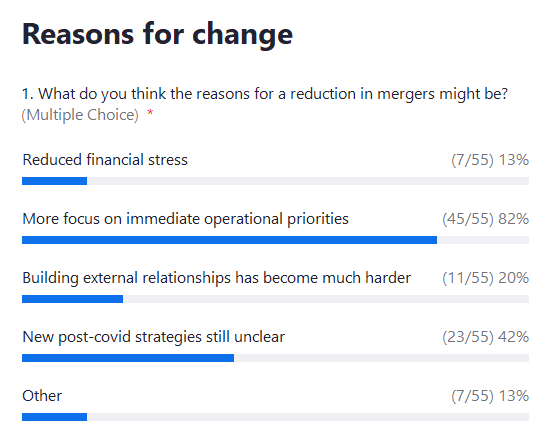Despite many predictions that the Covid-19 pandemic may cause a surge in the number of charities deciding to merge, data seems to suggest otherwise.
The latest Good Merger Index, published last week by Eastside People, has shown that charity sector mergers fell to their lowest level in eight years in 2021-22. However, research is yet to show us what the most recent year has meant for charities.
This decline could be a sign the charity sector was not as economically impacted as some in the sector thought it might be, possibly due to its successful campaigning for emergency funding from foundations and government. It may be that funding during the pandemic protected the sector from some financial ramifications, but a reduction in mergers does not in itself signal good financial health for the sector.
Moreover, informal collaboration ramped up throughout the pandemic, perhaps allowing charities other means of partnership working rather than merging. Mergers can also be time consuming and costly – not something charities can always do in times of crisis. Many charities also streamlined services or closed some areas of work.
There is also an important question about whether this trend will continue as we enter a cost-of-living crisis. Financial considerations may lead to an uptick in mergers, but this could have a negative effect on the landscape of small charities. If more merge, the sector may lose valuable local knowledge and expertise.
‘Complicated and costly’
Mergers are often lauded for reducing costs and duplication – making better use of resources and focusing on those activities that have the biggest impact – but often the picture is a little more muddled.
Sometimes, charities close all together in times of financial distress, or mergers happen as a last resort, and perhaps bypass important considerations. Sometimes the drive is around reducing duplication, and mergers happen when both organisations are in good financial health.
Duncan Shrubsole, director of policy, communications and research at Lloyds Bank Foundation for England and Wales (LBFEW) says the reason we haven’t seen lots of charities completely shutting or merging “is because if you're a charity trustee, you take steps before it goes bust”.
“Your job is always to take steps, so you end up making people redundant, stopping some services – so charities always do less before they shut down.”
He adds mergers can be “complicated and costly” and need a lot of time, particularly from CEOs, senior management, and trustees, so there is often no “headspace” for a merger.
Financial support during the pandemic
Nonetheless, it may be that the financial support during the pandemic curbed some of the need for mergers.
Tracey O'Keefe, account director partnerships and mergers at Eastside People, notes some of the data in the report reveals that financial stress levels were not as anticipated during the year.
“With government furlough schemes and funders stepping up to support our sector during the pandemic, perhaps financial stress as a key driver for merger was dampened down,” she says.
Though O'Keefe also notes that a merger is not an easy process and, “with demand for services ever-increasing and organisations having to pivot to digital delivery and home-working, perhaps the focus has been elsewhere”.
The organisation polled its audience on a recent Zoom regarding the findings, and asked attendees why they thought there were fewer mergers last year.
The poll revealed that 82%, of 55 people, thought it was because of more focus on operational priorities presented by Covid-19. This could be factors such as an increase in demand for services, moving to home working and moving services online.

‘The biggest is not always best’
Shrubsole says mergers have a role to play, but disagrees with the perspective that there are too many small charities.
He emphasises there is value in locally-rooted charities who are able to respond to communities – “the biggest is not always best, so the merger has to be the right thing for that charity to fulfil its mission”.
As a foundation LBFEW provides funding but also capacity building support to small and local charities, so as part of that if charities want to merge they fund consultants, and other support.
Shrubsole also found there was also a dip in inquiries for this type of support in the year covered by the report.
“There is a real question about large charities and the role that they play and the positive role that they need to play on behalf of the charity sector as a whole,” he says.
“In other times in the past, we have sometimes seen larger charities see difficult times or commissioning questions as a chance to gobble up market share, increase their size. And actually what we need is large charities to play a really positive role in supporting the sector as a whole.”
Cost-of-living crisis
Shrubsole notes the level of financial support available during coronavirus was higher than some people thought it might have been, he thinks “the real challenge” now “is that you've got all the costs rising, heating, energy, food, and real pressure to do something about staff wages, otherwise you'll lose staff”.
He says, in terms of foundation funding, charities are all asking for money at the same time and “we're all seeing many more people applying then did in the past”.
Going into the cost-of-living crisis there are “huge pressures on charities” and there are “real challenges” recruiting and retaining staff, he says, and with costs, so many “may not be in a good headspace to pursue thinking about merger, which is really difficult”.
On this, Shrubsole says the merger usually comes out of one or two circumstances. He says the best mergers come where people are thinking forward, and find they can do a better job if combined with another charity in a similar space.
The other one is from a more panic-led place, and many charities are in that position - “so that number might tick up over the next year or so”.
He suggests a big question is what happens with local government funding, as if councils go back to commissioning some charities may lose contracts or lose funding.
“That's where you might start seeing quite a few charities get financial difficulty quite quickly,” he says.
More generally, Shrubsole is keen to see a continuation in collaboration across the sector, as for “very few charities” merging is the right option “but for virtually every charity collaboration is the right option”.
Eastside People said it would begin to see the impact of the cost-of-living crisis track through in the next couple of years. Readers can let Civil Society News know their predictions through this Twitter poll.
Case study Asthma + Lung UK
One charity which merged just before the pandemic has said merging was still impacted by the pandemic, as it increased demand for services, but the merger allowed it to navigate the difficulties presented by coronavirus.
Asthma UK and the British Lung Foundation merged in January 2020. The charities, then known as Asthma UK and the British Lung Foundation Partnership, rebranded to Asthma + Lung UK in February 2022.
Ben Clarkson, chief operating officer at Asthma + Lung UK, said the organisations joined forces “to create a stronger, more unified voice” for those with a lung condition and to proportionately reduce running costs in order to increase charitable spend.
Nonetheless, Clarkson says: “There’s no doubt that merging two charities is tricky. Backend systems need to be carefully integrated, as well as workforces, strategies, cultures and much more.
“Our situation was also complicated by the charity being propelled to the frontline of the Covid-19 pandemic in the first 100 days of our merger, with calls into our helpline increasing fourfold and our website traffic up fivefold.”
Despite some of these challenges, he says by merging, “the charity was a bigger ship in a stormy sea and better able to navigate the raft of challenges posed by the pandemic”.
Clarkson says: “Our merger has enabled us to significantly reduce our office and other running costs and streamline our activity. We’ve increased our research output, last year funding nearly £4m in potentially life-saving and life-changing research projects, and expanded our charitable work into new areas, for example tackling air pollution.”
For Clarkson, “the combined organisation is more than the sum of its parts” and the charity “is a louder and more sustained voice”.
Poll
Civil Society News is conducting a Twitter poll on the question 'What will the impact of the cost-of-living crisis be on the number of charity mergers?'.
What will the impact of the cost-of-living crisis be on the number of charity mergers?
— Civil Society (@CivilSocietyUK) February 22, 2023
Related Articles










